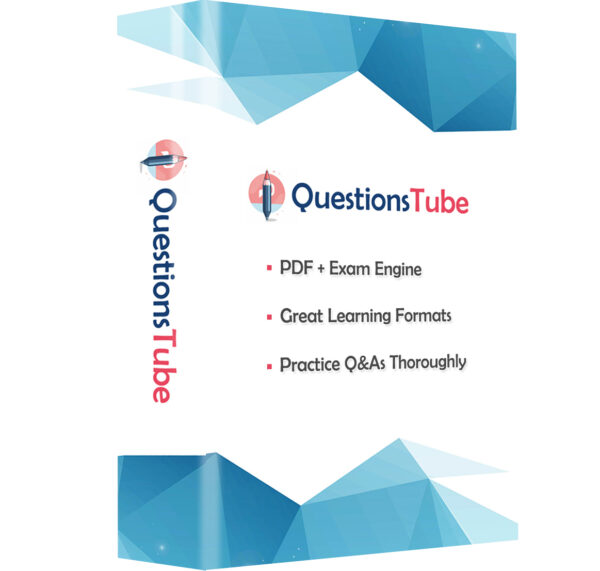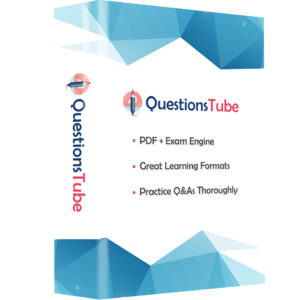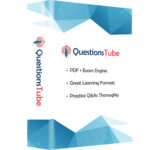Order our ARC-730 Practice Questions Today and Get Ready to Pass with Flying Colors!
Exam Code: ARC-730
Exam Name: Anypoint Platform Architecture: Integration Solutions
Exam Q&As: 95 Q&As
Last update: April 15, 2025
Product Description
The Anypoint Platform Architecture: Integration Solutions certification is highly valued in the IT industry and obtaining it can open a variety of career opportunities. One of the best ways to prepare for the Salesforce ARC-730 exam is by practicing with high-quality practice questions and understanding the answers. QuestionsTube offers ARC-730 exam questions with precise answers online for helping you make preparations for ARC-730 exam.
Anypoint Platform Architecture: Integration Solutions ARC-730 Exam Course
The Anypoint Platform Architecture: Integration Solutions (ARC-730) course is designed for solution architects, technical architects, and senior developers who are responsible for designing integration solutions for Mule runtime with Anypoint Platform. This course is also ideal for those pursuing a MuleSoft Integration Architect I credential.
Upon completion, participants will gain skills to:
- Translate functional and non-functional requirements into well-documented integration interfaces and implementation designs.
- Select the best Mule components and patterns for integration solution designs.
- Choose the deployment approach and configuration of Anypoint Platform from any of the available deployment options (MuleSoft-hosted or customer-hosted control plane and runtime plane).
- Design Mule applications for the various deployment options of the Anypoint Platform runtime plane.
- Apply standard development methods covering the full development lifecycle to ensure solution quality.
- Design reusable assets, components, standards, frameworks, and processes to support and facilitate API and integration projects.
- Implement the technical quality, governance, compliance, and operationalization of integration solutions.
- Advise technical teams on performance, scalability, reliability, monitoring, and other operational concerns.
To make sure that you can prepare for the ARC-730 exam well, you need to read all exam objectives first:
- Define Enterprise Integration Solution Objectives
- Architect for Customer Success with MuleSoft
- Document Integration Solutions
- Examine Key Architecture Template Components
- Identify Design Decisions
- Examine Anypoint Platform Capabilities and High-Level Components
- Review API-Led Development Techniques and Options
- Identify Anypoint Platform Components for Web APIs
- Explore Event-Driven API Support
- Compare Anypoint Platform Service and Deployment Models
- Implement Integration Solutions Using Mule Application Components
- Apply Mule Application Components and Capabilities
- Configure Class Loading Isolation in Mule Runtimes
- Explore Mule Processing Options
- Discover Event Processing Models
- Identify Mule Streaming Options and Behaviors
- Define Web API Fundamentals and Event-Driven Architecture
- Outline Event Processing Options for JMS And VM Connectors
- Select Appropriate Event Processing for Integrations
- Design Integration Use Cases
- Transform and Process Events with Reusability
- Simplify Complex Data Mappings Using Common Data Models
- Design Transformations Between Data Models
- Select Optimal Event Transformation, Data Validation, and Event Routing Patterns
- Examine Testing Testing Tools
- Define the MuleSoft-Provided Framework
- Design Testing Strategies for a Mule Application
- Define Test Coverage for Flows
- Identify Supported Service and Deployment Models
- Compare Anypoint Platform Deployment Models
- Design Containerized Deployments for Mule Runtimes
- Select Deployment Options for Various Use Cases
- Select Appropriate Mule Application State Storage
- Store a CloudHub Application State Using Object Store V2
- Manage Storage with Persistent Queues
- Configure Mule Application Caches for Storage
- Avoid Duplicate Processing of Previous Records
- Identify Mule Application Audit and Log Options
- Design Logging Strategies
- Select Logging Policies for Mule Application Log Files
- Examine Third-Party Log Management System Integration Options
- Specify Anypoint Platform Options for APIs and Integration Solutions
- Manage Property Files Across Environments
- Manage Anypoint Platform Environments for Mule Application Deployments
- Implement Continuous Integration and Continuous Delivery
- Automate Deployment and Management
- Identify Supported Transaction Criteria
- Identify Transaction Resources
- Establish Transaction Boundaries
- Select Transaction Types
- Manage Transactions Using Sage Pattern
- Compare Competing Non-Functional Requirements
- Validate Reliability Goals
- Design Mule Applications and Deployments That Meet Reliability Goals
- Identify Mule Application Reliability Patterns
- Define High-Availability (HA) Goals
- Balance HA Goals with Reliability and Performance Goals
- Use Anypoint Platform to Achieve HA in CloudHub and Customer-Hosted Runtime Planes
- Identify HA-Aware Connectors and Design Tradeoffs
- Define Mule Application Performance Goals
- Balance Performance Goals with Reliability and HA Goals
- Identify Performance Optimization and Tradeoff Use Cases
- Locate Performance Bottlenecks
- Implement Mule Applications for Performance
- Measure Mule Application Performance
- Adjust Mule Applications and Runtimes to Maximize Performance
- Define Anypoint Platform Security Concepts and Options
- Secure APIs on Anypoint Platform
- Explain Use Cases Solved by Anypoint Platform Edge Security
- Identify MuleSoft and Customer Security Responsibilities
- Evaluate Mule Application Security Risks
- Secure Mule Application Properties and Data in Transit
- Define Anypoint Platform Network Security Options and Architectures
- Secure Mule Applications with Java Key Stores
- Design Transport Layer Security Communication
- Compare CloudHub Deployments with Load Balancers
- Prepare Anypoint Virtual Private Cloud for Deployment
ARC-730 Practice Questions with Precise Answers
ARC-730 practice questions of QuestionsTube are designed to help you prepare for the Anypoint Platform Architecture: Integration Solutions exam by providing a thorough understanding of the exam topics. Each question is accompanied by a precise answer and a detailed explanation that help you understand the concept behind the question. This ensures that you not only memorize the correct answer but also understand the reasoning behind it.
Multiple Formats and Free Updates
QuestionsTube offers Salesforce ARC-730 practice questions in two formats: PDF and Exam Engine. The PDF format allows you to study the questions on any device, while the Exam Engine format simulates the real exam experience. Both the two formats can be downloaded directly without waiting. Additionally, we offer free updates for different periods, including 3-month, 6-month, and 1-year intervals. This ensures that you have access to the most up-to-date content, and you can prepare for the ARC-730 exam with confidence.
Money-Back Guarantee
We are confident in the quality of our ARC-730 practice exam questions and offer a money-back guarantee. If you fail the exam with the ARC-730 exam questions, we will refund your purchase price. This policy ensures that you can purchase our product with confidence, knowing that you are not taking any financial risk.
In conclusion, the Salesforce ARC-730 study materials of QuestionsTube are an excellent resource for anyone preparing for the Anypoint Platform Architecture: Integration Solutions exam. By using the ARC-730 exam questions, you can prepare for the exam with confidence and increase your chances of passing the ARC-730 exam on the first try.










Reviews
There are no reviews yet.